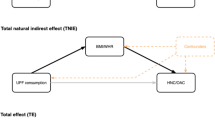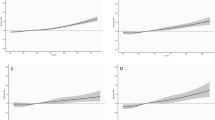Abstract
Purpose
To prospectively evaluate the association of vitamin/mineral supplementation with cancer, cardiovascular, and all-cause mortality.
Methods
In the Heidelberg cohort of the European Prospective Investigation into Cancer and Nutrition (EPIC-Heidelberg), which was recruited in 1994–1998, 23,943 participants without pre-existing cancer and myocardial infarction/stroke at baseline were included in the analyses. Vitamin/mineral supplementation was assessed at baseline and during follow-up. Cox regression models were used to estimate hazard ratios (HRs) and 95% confidence intervals (CIs).
Results
After an average follow-up time of 11 years, 1,101 deaths were documented (cancer deaths = 513 and cardiovascular deaths = 264). After adjustment for potential confounders, neither any vitamin/mineral supplementation nor multivitamin supplementation at baseline was statistically significantly associated with cancer, cardiovascular, or all-cause mortality. However, baseline users of antioxidant vitamin supplements had a significantly reduced risk of cancer mortality (HR: 0.52; 95% CI: 0.28, 0.97) and all-cause mortality (HR: 0.58; 95% CI: 0.38, 0.88). In comparison with never users, baseline non-users who started taking vitamin/mineral supplements during follow-up had significantly increased risks of cancer mortality (HR: 1.74; 95% CI: 1.09, 2.77) and all-cause mortality (HR: 1.58; 95% CI: 1.17, 2.14).
Conclusions
Based on limited numbers of users and cases, this cohort study suggests that supplementation of antioxidant vitamins might possibly reduce cancer and all-cause mortality. The significantly increased risks of cancer and all-cause mortality among baseline non-users who started taking supplements during follow-up may suggest a “sick-user effect,” which researchers should be cautious of in future observational studies.
Similar content being viewed by others
References
Beitz R, Mensink GB, Fischer B, Thamm M (2002) Vitamins–dietary intake and intake from dietary supplements in Germany. Eur J Clin Nutr 56(6):539–545
Pocobelli G, Peters U, Kristal AR, White E (2009) Use of supplements of multivitamins, vitamin C, and vitamin E in relation to mortality. Am J Epidemiol 170(4):472–483
Muntwyler J, Hennekens CH, Manson JE, Buring JE, Gaziano JM (2002) Vitamin supplement use in a low-risk population of US male physicians and subsequent cardiovascular mortality. Arch Intern Med 162(13):1472–1476
Watkins ML, Erickson JD, Thun MJ, Mulinare J, Heath CW Jr (2000) Multivitamin use and mortality in a large prospective study. Am J Epidemiol 152(2):149–162
Neuhouser ML, Wassertheil-Smoller S, Thomson C, Aragaki A, Anderson GL, Manson JE, Patterson RE, Rohan TE, van HL, Shikany JM, Thomas A, LaCroix A, Prentice RL (2009) Multivitamin use and risk of cancer and cardiovascular disease in the women’s health initiative cohorts. Arch Intern Med 169(3):294–304
Messerer M, Hakansson N, Wolk A, Akesson A (2008) Dietary supplement use and mortality in a cohort of Swedish men. Br J Nutr 99(3):626–631
Boeing H, Korfmann A, Bergmann MM (1999) Recruitment procedures of EPIC-Germany. European investigation into cancer and nutrition. Ann Nutr Metab 43(4):205–215
Bohlscheid-Thomas S, Hoting I, Boeing H, Wahrendorf J (1997) Reproducibility and relative validity of food group intake in a food frequency questionnaire developed for the German part of the EPIC project. European prospective investigation into cancer and nutrition. Int J Epidemiol 26(Suppl 1):S59–S70
Bohlscheid-Thomas S, Hoting I, Boeing H, Wahrendorf J (1997) Reproducibility and relative validity of energy and macronutrient intake of a food frequency questionnaire developed for the German part of the EPIC project. European prospective investigation into cancer and nutrition. Int J Epidemiol 26(Suppl 1):S71–S81
Wareham NJ, Jakes RW, Rennie KL, Schuit J, Mitchell J, Hennings S, Day NE (2003) Validity and repeatability of a simple index derived from the short physical activity questionnaire used in the European prospective investigation into cancer and nutrition (EPIC) study. Public Health Nutr 6(4):407–413
Li JY, Taylor PR, Li B, Dawsey S, Wang GQ, Ershow AG, Guo W, Liu SF, Yang CS, Shen Q (1993) Nutrition intervention trials in Linxian, China: multiple vitamin/mineral supplementation, cancer incidence, and disease-specific mortality among adults with esophageal dysplasia. J Natl Cancer Inst 85(18):1492–1498
Genkinger JM, Platz EA, Hoffman SC, Comstock GW, Helzlsouer KJ (2004) Fruit, vegetable, and antioxidant intake and all-cause, cancer, and cardiovascular disease mortality in a community-dwelling population in Washington County, Maryland. Am J Epidemiol 160(12):1223–1233
Hertog MG, Bueno-de-Mesquita HB, Fehily AM, Sweetnam PM, Elwood PC, Kromhout D (1996) Fruit and vegetable consumption and cancer mortality in the caerphilly study. Cancer Epidemiol Biomarkers Prev 5(9):673–677
Sauvaget C, Nagano J, Hayashi M, Spencer E, Shimizu Y, Allen N (2003) Vegetables and fruit intake and cancer mortality in the Hiroshima/Nagasaki life span study. Br J Cancer 88(5):689–694
Colditz GA, Branch LG, Lipnick RJ, Willett WC, Rosner B, Posner BM, Hennekens CH (1985) Increased green and yellow vegetable intake and lowered cancer deaths in an elderly population. Am J Clin Nutr 41(1):32–36
Myung SK, Kim Y, Ju W, Choi HJ, Bae WK (2010) Effects of antioxidant supplements on cancer prevention: meta-analysis of randomized controlled trials. Ann Oncol 21(1):166–179
Bardia A, Tleyjeh IM, Cerhan JR, Sood AK, Limburg PJ, Erwin PJ, Montori VM (2008) Efficacy of antioxidant supplementation in reducing primary cancer incidence and mortality: systematic review and meta-analysis. Mayo Clin Proc 83(1):23–34
Ferrucci LM, McCorkle R, Smith T, Stein KD, Cartmel B (2009) Factors related to the use of dietary supplements by cancer survivors. J Altern Complement Med 15(6):673–680
Miller MF, Bellizzi KM, Sufian M, Ambs AH, Goldstein MS, Ballard-Barbash R (2008) Dietary supplement use in individuals living with cancer and other chronic conditions: a population-based study. J Am Diet Assoc 108(3):483–494
Velicer CM, Ulrich CM (2008) Vitamin and mineral supplement use among US adults after cancer diagnosis: a systematic review. J Clin Oncol 26(4):665–673
Omenn GS, Goodman GE, Thornquist MD, Balmes J, Cullen MR, Glass A, Keogh JP, Meyskens FL, Valanis B, Williams JH, Barnhart S, Hammar S (1996) Effects of a combination of beta carotene and vitamin A on lung cancer and cardiovascular disease. N Engl J Med 334(18):1150–1155
Heart protection study collaborative group (2002) MRC/BHF Heart Protection Study of antioxidant vitamin supplementation in 20,536 high-risk individuals: a randomised placebo-controlled trial. Lancet 360(9326):23–33
The alpha-tocopherol, beta-carotene cancer prevention study group (1994) The effect of vitamin E and beta carotene on the incidence of lung cancer and other cancers in male smokers. N Engl J Med 330(15):1029–1035
Messerer M, Wolk A (2004) Sensitivity and specificity of self-reported use of dietary supplements. Eur J Clin Nutr 58(12):1669–1671
Satia-Abouta J, Patterson RE, King IB, Stratton KL, Shattuck AL, Kristal AR, Potter JD, Thornquist MD, White E (2003) Reliability and validity of self-report of vitamin and mineral supplement use in the vitamins and lifestyle study. Am J Epidemiol 157(10):944–954
Acknowledgments
This study was supported by the Deutsche Krebshilfe [Grant-No.: 70-488-Ha I] and the German Research Foundation, Graduiertenkolleg 793: Epidemiology of communicable and chronic noncommunicable diseases and their interrelationships.
Conflict of interest
The authors declare that they have no conflict of interest.
Author information
Authors and Affiliations
Corresponding author
Rights and permissions
About this article
Cite this article
Li, K., Kaaks, R., Linseisen, J. et al. Vitamin/mineral supplementation and cancer, cardiovascular, and all-cause mortality in a German prospective cohort (EPIC-Heidelberg). Eur J Nutr 51, 407–413 (2012). https://doi.org/10.1007/s00394-011-0224-1
Received:
Accepted:
Published:
Issue Date:
DOI: https://doi.org/10.1007/s00394-011-0224-1




